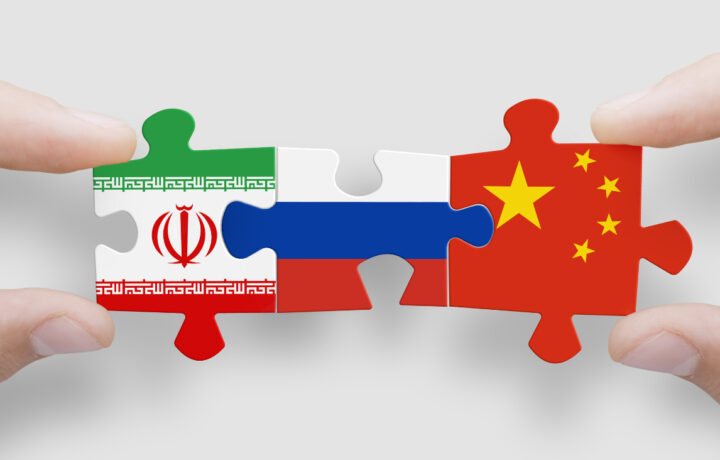Investigators say Chinese-manufactured parts are helping Iran to rapidly supply drones to Russia. When Ukraine downed an Iranian drone a few months ago, a Chinese-made voltage converter was found in the weapon. The part was manufactured earlier this year, demonstrating a very rapid three-month production and replenishment cycle for Moscow’s terrorizing drones, used on Ukrainian cities.
Despite U.S. efforts to block the global supply chain to both Iran and Moscow, parts are continuing to flow, allowing production of drones and continued shipment to Russia. This may not come as a surprise, but the situation is alarming for some analysts, especially in the wake of recent geo-political events this past week. What are those concerns?
Shanghai Five
According to Russian Foreign Minister Sergei Lavrov, Iran’s full-fledged membership in the Shanghai Cooperation Organization (SCO) will be decided today. During an on-line meeting on June 30, Lavrov indicated that Iran will sign the agreement, along with Belarus’s.
The SCO was originally named the Shanghai Five. It was formed in 1996 to increase confidence between border countries of China and four former Soviet republics — Russian Federation, Kazakhstan, Kyrgyzstan, and Tajikistan. India and Pakistan became full members of the organization in 2017. The SCO was originally concerned with moving military forces away from the common borders. Soon after, the group morphed into an organization focused on economic cooperation, which China has used to court better trade ties, and enhance silk road interest.
During the same meeting, Lavrov’s called for a widening of the UN Security Council – to give more representation to Asian, African, and Latin American countries, to disrupt “Western domination of the world.”
Tehran’s Belief in a Triple Alliance
With the growing alliance between Iran, Russia, and China, new threats to both NATO and the Middle East are emerging. Iran, Russia, and China work on their strategic alliances with each other and around the globe, enabling the countries to get around sanctions. Therefore, as Iran continues suppling Russia with drones using Chinese parts, we must assume there will be technological advantages for Iran, from the two nuclear powers.
Simultaneously, Iran’s Ali Akbar Velayati, close advisor to Iran’s Supreme Leader, stated Iran-Saudi ties are extremely important, urging regional countries to “unite against the Zionists.” He stated, “The strategic relations between Iran, China, and Russia are gradually taking shape.” Velayati added, Iran’s relations with Russia are strategic, and “differences in some issues do not have a negative impact on them.” Analysts suggest Russia will continue to rely on Iran to challenge the North Atlantic Treaty Organization (NATO). Russia perceives the west is weakening the Islamic Republic of Iran, which provides an additional threat to Russia and their national security interests.
Velayati has publicly suggested Russia likely believed the West would not back Ukraine during the recent large-scale invasion. This perception was based upon a perceived Western lethargy during the Russian incursion of Ukraine in 2014, the subsequent Russian intervention in Syria in 2015, and the uninspiring Afghanistan withdrawal by the U.S. in August of 2021. Velayati added Russia was wrong about the U.S. and West, but recent events benefit Iran as they have become a necessary ally for Russia during their continued quest for nuclear weapons.
China, Iran, and Russia in America’s Backyard
During recent months, the Triple Alliance members have been making threatening moves into Latin America. The Chinese have offered Cuba billions of dollars in exchange for the construction of a sophisticated intelligence facility to be used against the U.S.
Over the past few months, Tehran has provided and Venezuela economic support to help revitalize its oil industry, while committing hundreds of millions to assist Nicaragua constructing its first deep-water port and hydropower plant.
In April, Russia Foreign Minister Lavrov completed a tour of Latin America to strengthen Moscow’s alliances with Brazil, Venezuela, Nicaragua, and Bolivia. While developing partnerships in the region, Lavrov continually emphasized Russia’s new foreign policy – Western power is weakening and a new multipolar world is emerging.
Washington knows the news from Latin America is not good. Even though reports may be accurate, it is not politically convenient to discuss the situation. Therefore, very little is being expressed by the current administration.




